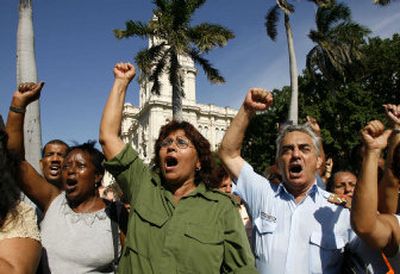Questions remain on Castro’s status

MIAMI – Cuban President Fidel Castro is in stable condition and recovering from surgery to stop intestinal bleeding, Cuban officials said Tuesday, but they issued no new photos of the 79-year-old dictator and provided little new information about his illness.
A cryptic statement attributed to Castro and read on an evening news program in Havana suggested that physicians were uncertain about his prognosis.
“I cannot invent good news, because that wouldn’t be ethical,” the statement said. “And if the news were bad, the only one to benefit is the enemy.”
“I wish to say that the situation is stable, but a real evolution of the state of one’s health requires the passing of time,” the statement said. “The most I could say is that the situation will remain stable for many days before a verdict can be delivered.”
The lack of detail left room for speculation about whether Castro, who turns 80 on Aug. 13, will stage a full recovery or whether Cuba might be on the cusp of change after 47 years of one-man rule.
U.S. officials said they believed that Castro was still alive, and Cuba’s Parliament Speaker Ricardo Alarcon said the “final moment is still very far away.”
Alarcon, however, also called the surgery a “delicate operation,” and the sketchy information spurred some to consider alternatives. “It’s really serious, because otherwise he would speak,” a Havana resident named Jesus, who asked that his last name be withheld, said by telephone.
Castro’s brother and the inheritor of his power, Raul, 75, remained out of sight amid reports of unusual troop movements in Havana and on the eastern end of the island. Most residents of the capital appeared to be going about their daily business, however.
Cuba had announced Castro’s surgery Monday night in an uncharacteristically detailed announcement, saying he was suffering from “sustained” intestinal bleeding and was ceding power to Raul. But there was no further news until the evening Round Table news program where the Castro statement was read.
In Washington, White House spokesman Tony Snow said the administration believed that Castro had survived the operation. He also said that the transfer of power to Raul Castro would make no difference in U.S. hostility toward the island’s government.
“The fact that you have an autocrat handing power off to his brother does not mark an end to autocracy,” Snow said.
Snow said the temporary transfer of power wouldn’t generate an immediate change in U.S. policy. “There are no plans to reach out,” he said, calling Castro’s brother his “prison keeper.”
The State Department reiterated U.S. policy that the United States would act only if a transitional government moved toward democracy.
In Cuba, government opponents in the eastern city of Guantanamo said armed forces units were seen rounding up reservists as state security agents paid unfriendly visits to dissidents.
“We know the military is mobilized: they have us corralled,” Guantanamo dissident Mariela Castro Fernandez said by telephone. “There is a terrible silence outside.”